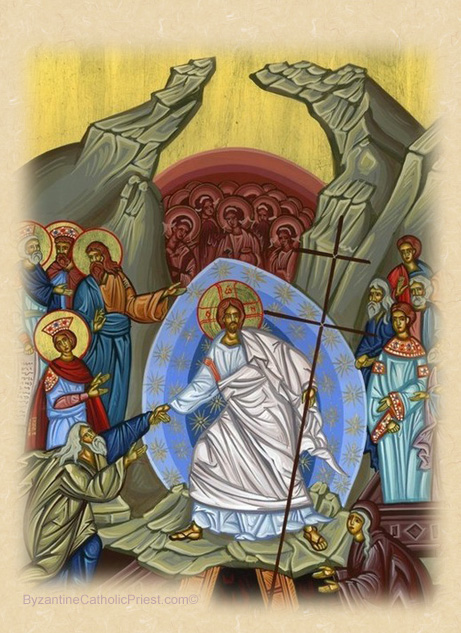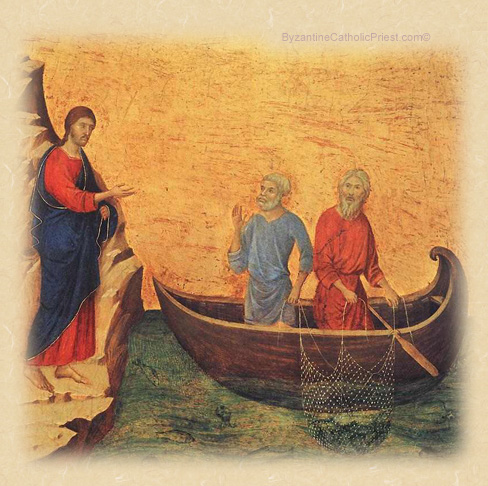Cherries Ain't the Only Fruit in the Bowl.Acts 1:1-8;
John 1:1-17. Pascha: The Resurrection of Our Lord, God & Savior, Jesus Christ.
Return to ByzantineCatholicPriest.com. |
1:33 PM 3/31/2013 — Last year I remember speaking to you about my first Holy Week as a priest some twenty-five years ago, and I think the message I was trying to convey bears repeating. If you remember, it wasn't simply my first Holy Week as a priest; it was also the occasion of my first funeral as a priest; and, it was a particularly difficult funeral inasmuch as it was a suicide. The contrast, for me personally, was very striking, as you can imagine. On the one hand I was dealing with someone who felt so hopeless that he saw no other option but to check out of life completely, while at the same time I was busy preparing for the celebration of the Feast of the Resurrection, which is supposed to be a feast of hope. Before that week I would have said that there was no such thing as a person who had absolutely no hope at all; but, obviously, I was wrong.
There is a conventional wisdom that tells us that when someone commits suicide, it's because they're suffering from some kind of mental illness, and so they're not responsible for their actions. And even the practice of the Church reflects this idea: some of you may be old enough to remember that, in the “old days,” suicides were never buried from church.  Murder is a mortal sin, and suicide is the murder of oneself. But there was no such thing as the science of psychology in those days. We do funerals for suicides now based on the presumption that no reasonable person would take his own life if he was in his right mind. Murder is a mortal sin, and suicide is the murder of oneself. But there was no such thing as the science of psychology in those days. We do funerals for suicides now based on the presumption that no reasonable person would take his own life if he was in his right mind.
But I tend to think—and this is just my opinion—that the time may have arrived where we can revisit this issue again. We are now living in a culture and in a time in which life has never been cheaper than it has ever been before. Our unborn children are disposable, for example; and, for a variety of reasons: deformed or defective in conception, or perhaps conceived as the result of some crime or act of violence, or sometimes nothing more substantive than being unplanned or unexpected. The elderly are also becoming increasingly disposable, especially when caring for them requires an investment in time and money. Even we, ourselves, have become expendable in the minds of some when we find out we're suffering from some terminal condition that promises suffering and pain, and in some cases even if that pain and suffering is only psychological. And, of course, all of these new attitudes require a complete rejection of the notion that life on this earth is only a prelude, and that how well we endure the hardships of this life has a lot to do with whether we are are found worthy of the next life. In other words, it's a lack of faith. Blessed Pope John Paul II called this new attitude the “culture of death.” It doesn't see itself that way; it believes it's focused on living life to the fullest; hence, it's catch-phrase: “quality of life”; but, life has little to do with it. Just consider the notion that our new national health care system has introduced: that when someone is in medical need, it isn't enough now to consider what can be done to help him, but we must now add to that the consideration of whether such action is worth the expense and drain on the rest of the system. As I said, life is cheaper now than it has ever been before.
And this is the reason why I think it may be time to rethink the conventional wisdom regarding suicide. With the culture of death so pervasive in our society, I'm not sure we can presume any longer that someone who kills himself is crazy. He may simply have bought into the pervasive culture in which he lives, in which life in this world must be perfect, or else it isn't worth living.
Now, you're probably saying to yourself: the only one crazy here is Father Michael, talking about suicide on Easter Sunday; but, there's a reason, and it all goes back to my memories of my first Holy Week as a priest, during which I performed my first funeral which just happened to be for someone who had killed himself. When some incident like that comes along it makes you think. We come to church on Sunday and we sing the beautiful music and say all the right things in church, but do we really truly believe that Jesus Christ was dead and came back to life? And if we truly believe it, how does that impact the way we choose to live our lives while we're here?
I didn't preach to you this year during the various Holy Week services like I did last year, but I would like you to think back for a moment to the readings we heard during them. What do you think was going through the minds of the disciples as they saw Jesus hanging on the cross? There’s a very interesting scene at the very end of the Gospel of St. John—there are a lot of curious scenes that are recorded in John’s Gospel that aren’t in the other three, and a lot of them we don’t read about in Church. It’s after the Crucifixion, and Peter and a few of the other disciples are sitting on the beach around a fire. Jesus, who had just risen from the dead, walks up to them, but they don’t know who he is. And after a while Peter gets up and says, “I’m going fishing.” It’s a significant moment, because what was Peter before he met our Lord? He was a fisherman. Jesus told him that he would become a fisher of men, but that was three years ago; and, now Jesus was dead, or so Peter thought. When he gets up off the beach and says, “I’m going fishing,” what he’s really saying is, “It’s over. It was nice while it lasted, but it’s over. I’m going back to they way things were before I even met this Jesus.”  Jesus, whom he doesn’t recognize, goes fishing with him, and what do you think happens? Jesus repeats the very same miracle he performed when first he met Peter: the miraculous catch of fish. And, of course, with that, Peter recognizes who he is, and realizes that he’s committed the sin of losing hope. Jesus, whom he doesn’t recognize, goes fishing with him, and what do you think happens? Jesus repeats the very same miracle he performed when first he met Peter: the miraculous catch of fish. And, of course, with that, Peter recognizes who he is, and realizes that he’s committed the sin of losing hope.
The lesson wasn't lost on Peter, and it can't be lost on us. When we’ve reached the point where we cannot conceive of any way out of our problems—when there is just no solution that we can think of—all of a sudden Jesus provides one that we couldn’t have thought of because, to our way of thinking, it was impossible.
Take, for example, the ultimate fear of man: death. It’s a particularly appropriate example for Easter. We fear death so because, to our way of thinking, there’s no escape from it; there’s no way around it. You can’t buy you’re way out of it, you can’t lie your way out of it, you can’t cry your way out of it, you can’t trick your way out of it. Everybody dies. We fear it because we can’t beat it. And we do everything we can possibly do to pretend that it doesn’t exist. We don’t even like to talk about it. When someone we know dies we never say that So-and-so died; we always say that So-and-so has “passed away.” And then we take our loved ones who have died and we make them up to look like they’re sleeping, and we dress them in their Sunday best and give them a new hairdo—anything we can do to make it look like they’re anything but dead. Not to mention all the crazy things we do to prolong our own lives as long as possible: we starve ourselves with crazy diets and take vitamins by the truck load and invest in whatever new contraption or plan that promises to make us look and feel younger. Stay up late and watch television and you'll see all the commercials for products or potions or contraptions that promise to make you feel younger, look younger, restore your sexual vitality, etc., etc. Then we come to Church at Easter and we hear that the Resurrection of Christ conquers death. What do we think that means? Does it mean that Jesus makes it so no one dies? Of course not, because we know that people do die; we've seen it happen to people we love. What it means is something that is impossible for us to comprehend in today's culture of death, something that cannot be understood or even coped with without faith. The resurrection of Christ from the tomb conquers death not by making it so that no one dies, but by making death irrelevant. We pass from this world because this world is not our destiny.
That is what gives the Christian his hope: not that Jesus can somehow take the problems of this world and make them all go away; what gives the Christian his hope is the knowledge that this world will one day pass away and, if we have persevered—if we have been faithful to him during our time here—then we, too, will enjoy an everlasting life where the problems of this world simply do not exist.
Hopelessness is a sin precisely because it proves that we don’t believe in the resurrection of Jesus Christ from the dead. If we believe that life truly offers no options, that there is no way out, then what we’re saying is, “It’s over. There is nothing left for me.” And how can someone who believes in Jesus ever say that? The irony of this is that the enemies of Christ and his Church are constantly point an accusing finger at us, saying that we're the depressing ones, always complaining about what people should do and what people shouldn't do. They mock our criticism of the culture of death because they think we're trying to take away peoples' freedom for some weird power-hungry reason, whether it's the freedom of same sex couples to be married, or the freedom of someone to murder an unborn child, or the freedom to protect our time and money from being required to care for the elderly, the poor, the sick, the mentally deficient, or anyone else whom the culture of death finds inconvenient. The reality is that we're the only ones left in society to who truly appreciate life for what it is: a waiting room for the next life. Of course, one would have to believe in the next life, and in the Gospel, in order to appreciate that.
There is an old saying that life isn't always a bowl of cherries. Whoever made up that saying must have really liked cherries. But for the Christian—regardless of whether he likes cherries—it's really quite meaningless, because the resurrection of Jesus from the tomb means that life in this world isn't the only fruit in our future.

|

